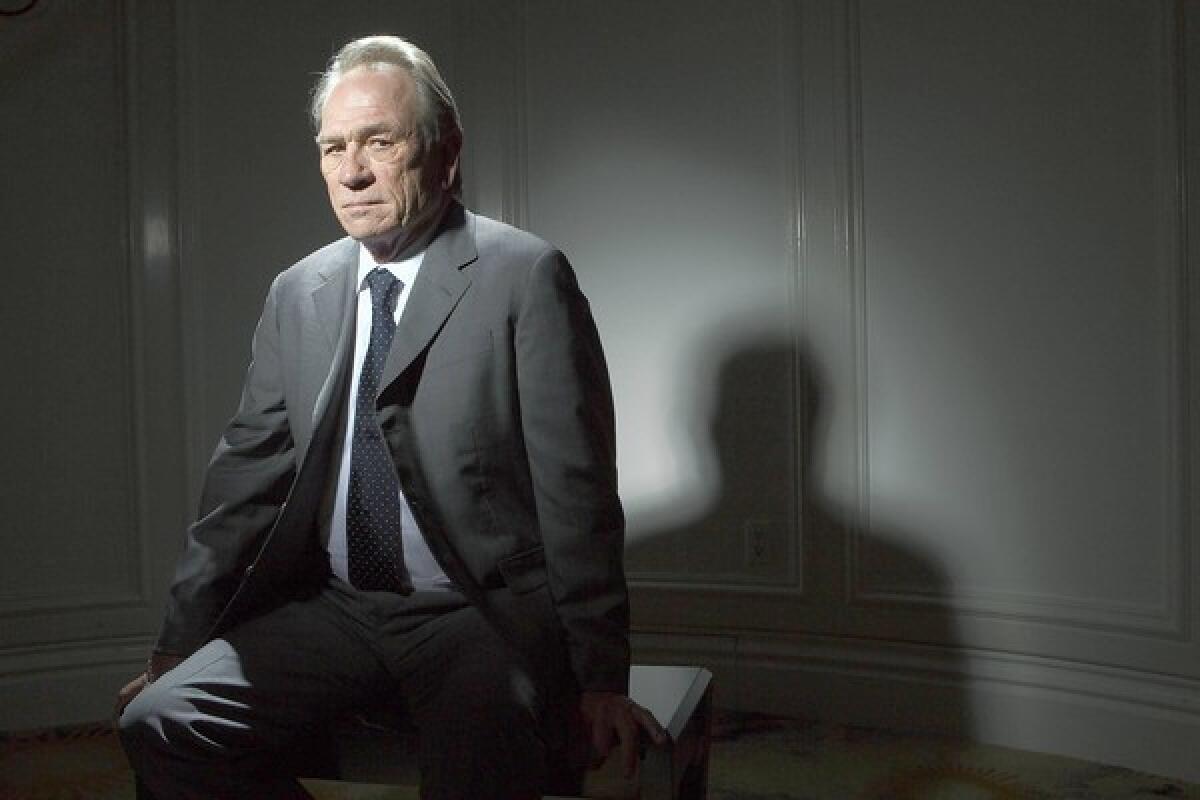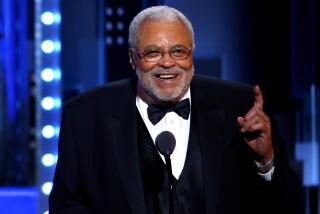Tommy Lee Jones on playing a real firebrand, in fake hair

- Share via
Ask Tommy Lee Jones about his cantankerous performance as radical Republican Thaddeus Stevens in Steven Spielberg’s “Lincoln” and the veteran performer bristles. Perhaps mistaking the question for a personal comment, the Harvard-educated, Oscar-winning actor feigns ignorance: “Cantankerous? I don’t know what the meaning of that word is!”
He paused, adding: “And I hear that word all the time.”
If the “No Country for Old Men” star has been hearing the C-word more than usual lately, it’s likely due to Jones’ spirited portrayal of the fiery abolitionist congressman in the acclaimed biopic, which arrived in theaters earlier this month featuring Daniel Day-Lewis as America’s 16th president.
Jones brings a lascerating intensity to Stevens — the power-brokering chairman of the House Ways and Means Committee and a key figure in helping pass the 13th Amendment, abolishing slavery — stealing nearly every scene in which he appears. And despite the actor’s total disavowal of the awards season politicking process, Oscar whisperers have already begun to handicap Jones’ shot at a supporting actor nomination.
But it’s hardly a no-brainer that Jones, 66 — a Texan of few words known for portraying strong, silent types in movies such as the blockbuster “Men in Black” franchise — should come to be cast as a flamboyant Pennsylvania politician known for both his hard-charging wit and his withering oratory skills — which is the primary fun of watching Jones at work in “Lincoln.” Playing a guy who’s as serious as a heart attack, who’s hell-bent on overturning slavery as a moral imperative, Jones throttles through quite a few actorly speeds: sly and Machiavellian, granite-faced and unflinching, trash-talking and pitbull tough, even goofy and tender.
“Great things are done by real people, not people with angel wings and halos,” Jones said. “Sometimes they stink; sometimes they’re glorious. Sometimes when they eat boiled crabs, the juice falls down their shirts. To be reminded of that while being entertained is worthwhile.”
Jones underscored the character’s humanity with what, for him, is a highly unusual prop: a floppy black wig that looks totally out of place framing the actor’s Easter Island statue-like features. Turns out that Thaddeus Stevens suffered from alopecia, an ailment that causes baldness and body hair loss, which prompted Jones to volunteer for some extreme facial deforestation. “I originally suggested that we shave my eyebrows,” he recalled. “Steven would have nothing to do with that. He said, ‘Your eyebrows are the most expressive part of your face.’”
Although the gruff Texan brushes aside any notion that the wig affected his performance, he enjoys the frisson it provides his most dramatic scenes. “I liked the fact that there was this element of ridiculousness in these moments that carried so much gravity,” the actor said. “That was kind of cool.”
In an e-mail to The Times, Spielberg praised the actor’s multifaceted performance with an extended musical metaphor.
“Tommy is not just a subtle solo instrument,” Spielberg said. “There is an entire symphony orchestra inside that man, and I knew this when I cast him in the hope that he would represent the Thaddeus Stevens that history tells us was flamboyant, volatile, radically determined and, to some, even tender-hearted. Tommy gave me everything I asked for and much, much more.”
Although Jones won a supporting actor Oscar in 1993 for portraying U.S. Marshal Samuel Gerard in “The Fugitive” — another relentless character of unshakable moral convictions who barks dialogue and strikes righteous fear in those who oppose him — the actor refuses to countenance taking part in any sort of Oscar campaign.
“I don’t think about it,” Jones said with finality. “And I surely don’t talk about it.”
More to Read
Sign up for The Envelope
Get exclusive awards season news, in-depth interviews and columnist Glenn Whipp’s must-read analysis straight to your inbox.
You may occasionally receive promotional content from the Los Angeles Times.











